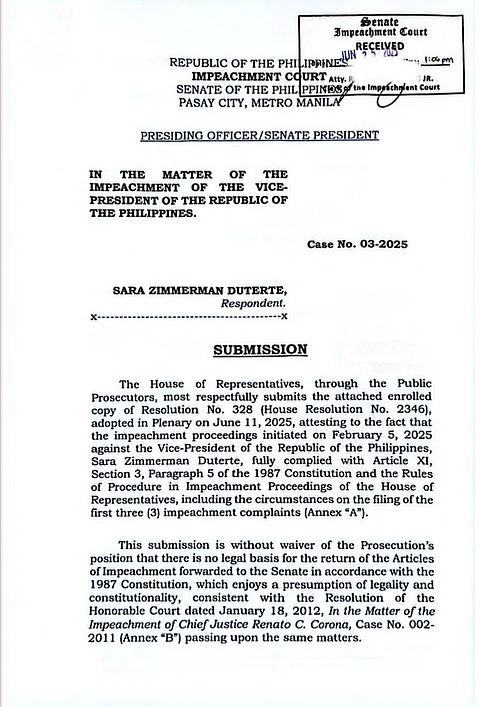
- NEWS
- the EDIT
- COMMENTARY
- BUSINESS
- LIFE
- SHOW
- ACTION
- GLOBAL GOALS
- SNAPS
- DYARYO TIRADA
- MORE

The House prosecution panel on Wednesday formally submitted to the Senate impeachment court a certification maintaining that it did not violate the one-year bar rule, which the Senate had invoked as grounds for remanding the verified impeachment complaint against Vice President Sara Duterte.
The certification, an enrolled copy of the resolution adopted by the House on 11 June, affirms that the articles of impeachment complied with constitutional procedures.
The prosecution also resubmitted a manifestation of its entry of appearance — without any reservation, limitation, or qualification — confirming their intent to appear before the court and defend the charges laid out in the seven articles of impeachment.
These submissions signal the prosecution’s compliance with the Senate impeachment court’s directives after the trial was temporarily halted over questions of jurisdiction and procedural violations by the 20th Congress.
“This submission is without waiver of the prosecution’s position that there is no legal basis for the return of the articles of impeachment forwarded to the Senate in accordance with the 1987 Constitution,” the document reads.
Several Duterte allies in the Senate — Christopher "Bong" Go, Ronald dela Rosa, Robin Padilla, and Imee Marcos — challenged the legality of the impeachment case crossing over into the 20th Congress. They cited Article XI, Section 3, Paragraph 5 of the Constitution, which prohibits filing more than one impeachment complaint against the same official within a year.
The Senate returned the complaint to the House on 10 June, requiring two conditions for it to proceed: (1) a certification that the filing did not violate the one-year bar, and (2) confirmation that the House would pursue the case in the 20th Congress.
While the House has complied with the first condition, it has yet to act on the second. Prosecutors argue that fulfilling the second condition is impossible since the 20th Congress has not yet convened.
Former Supreme Court Associate Justice Adolfo Azcuna, one of the framers of the Constitution, warned that if the House fails to take action before the 19th Congress adjourns on 30 June, the 20th Congress will not be obligated to re-transmit the complaint to the Senate. This raises the possibility of further delays in the already stalled trial.
Vice President Duterte’s legal team earlier petitioned the Supreme Court to stop the trial, accusing the House of grave abuse of discretion by freezing action on the first three impeachment complaints. She repeated this argument in her official response to the articles of impeachment forwarded to the Senate on Monday.
House prosecutors maintain that, unlike the earlier complaints, the fourth complaint moved directly to the Speaker’s Office and plenary for adoption after being signed and endorsed by 215 lawmakers—far exceeding the one-third vote required under the Constitution. This allowed it to bypass committee hearings and proceed directly to the Senate.
Filed in just under two months, this was the fourth complaint lodged against Duterte — and the only one formally adopted by the House. She is the first vice president in Philippine history to be impeached.
Duterte faces charges of graft and corruption, bribery, betrayal of public trust, culpable violation of the Constitution, and other high crimes. The seven articles of impeachment largely stem from the alleged misuse of P612.5 million in confidential and intelligence funds during her tenure as Vice President and concurrent Education Secretary. She is also accused of plotting to assassinate President Ferdinand Marcos Jr.’s family — an allegation she has strongly denied.
Duterte insists her use of confidential funds was lawful and says her controversial assassination remark was “taken out of context.”
The Senate is expected to try the case when the 20th Congress opens on 28 July. A conviction would require a two-thirds vote — 16 out of 24 senators — and would permanently bar Duterte from holding public office, effectively ending her prospects for a presidential run.
